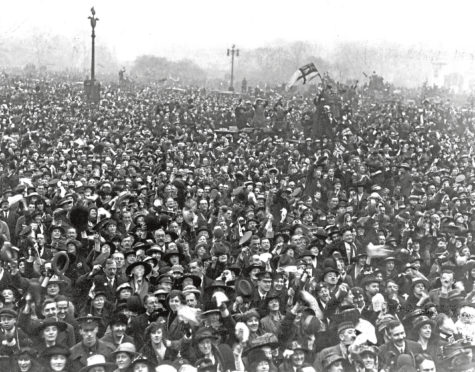It’s 100 years ago this week since James Scott Anderson was demobbed at the end of the First World War.
And, although the former Moray soldier died in 1986, aged 91, his experiences during the conflict have now been published in a new book, methodically edited by his daughter, Ann Walker, as a reminder of what so many troops went through.
Towards the end of February, 1919, he was allowed to return home after four-and-a-half years’ service in the Scottish Horse, a yeomanry regiment, and in the 13th Battalion Black Watch Highlanders.
His work “So once more it was bundle and go” is both a history book and an adventure story. In his role as a scout, it highlights the terrors of wandering about in No Man’s Land in the dark, within touching distance of the enemy, and chronicles the terrible scale of the casualties which he witnessed throughout the hostilities.
In addition to the tedium, it illustrates the hardship and relentless tension of being encamped in the open desert in Egypt or in the Struma Valley in Salonika, or Mr Anderson’s life during the last 100 days of WW1 in France, where he and his colleagues were engaged in reconnaissance work with the danger of being wiped out around almost every corner of every little village.
Mrs Walker said: “It’s an old man’s recollections of the life-changing experience of going to war as a young soldier and being sent far from home to fight in conditions just as dangerous and physically demanding as those encountered in France and Belgium, then finally returning to take on adult responsibilities as head of the family in running the family farm and supporting his widowed mother and his nine siblings.
“Not knowing whether what he had written was factually accurate, I carried out a considerable amount of research around the campaigns he took part in to verify some of his statements.
“I started work on this in 2009 and once I was satisfied with the accuracy of his account (checked out in the relevant War Diaries held in the National Archives at Kew and at the Scottish Horse Archive in Dunkeld), I edited his story and decided to self publish it.
“My father died in 1986, but it wasn’t until I had retired completely that I had the time to devote to word processing his tiny writing on closely-written sheets of airmail paper.
“When I read his story, I felt I had to make it available to a wider readership than simply to us, his family. His story reflects that of so many of the young men who willingly went to war in 1914.
“Like so many others in later life, he never spoke about his experiences. It wasn’t until I read his account that I knew where he had been sent and how it had been for him.
“I always knew that the Commemorations on Remembrance Sunday were important to him and that he respected highly two of the officers under whose command he served. Other than that, I knew practically nothing.”
Mrs Walker has ensured her father’s legacy and bravery will not be forgotten. Copies are the book can be purchased by contacting ann@2samoas.co.uk
****
